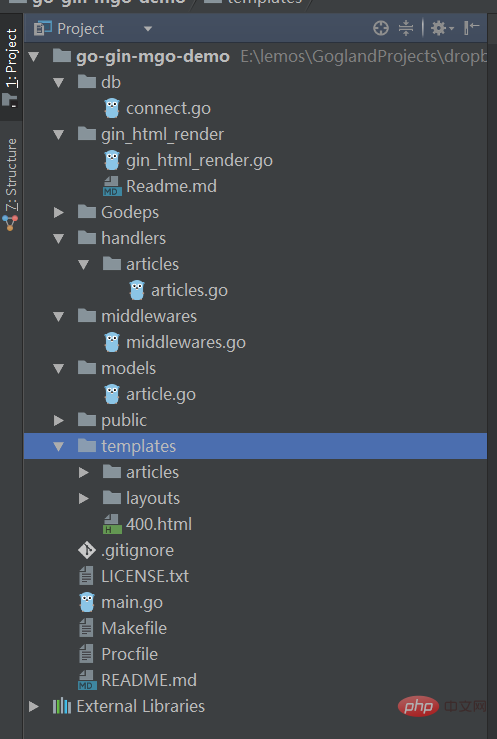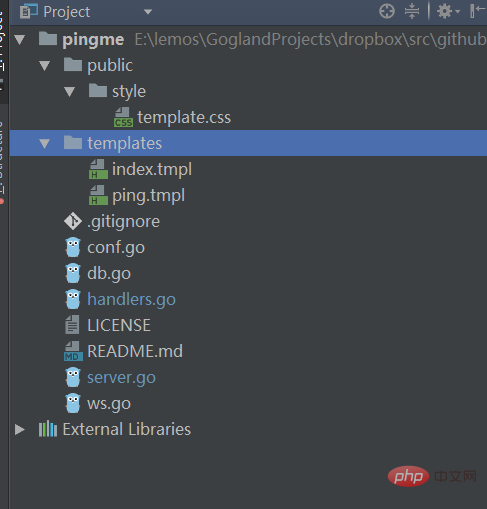Golangでルーティングをカプセル化する方法
- 尚オリジナル
- 2020-03-27 15:25:333229ブラウズ

カプセル化方法 1. ルーティングは main 関数に記述され、データベースへの最初の接続は init() 関数に配置されます。 ,

最初に main.go を見てみましょう
db
func init() {
db.Connect()
}を初期化する初期化関数 2 つ目、routing
func main() {
// Configure
router := gin.Default()
// Set html render options
htmlRender := GinHTMLRender.New()
htmlRender.Debug = gin.IsDebugging()
htmlRender.Layout = "layouts/default"
// htmlRender.TemplatesDir = "templates/" // default
// htmlRender.Ext = ".html" // default
// Tell gin to use our html render
router.HTMLRender = htmlRender.Create()
router.RedirectTrailingSlash = true
router.RedirectFixedPath = true
// Middlewares
router.Use(middlewares.Connect)
router.Use(middlewares.ErrorHandler)
// Statics
router.Static("/public", "./public")
// Routes
router.GET("/", func(c *gin.Context) {
c.Redirect(http.StatusMovedPermanently, "/articles")
})
// Articles
router.GET("/new", articles.New)
router.GET("/articles/:_id", articles.Edit)
router.GET("/articles", articles.List)
router.POST("/articles", articles.Create)
router.POST("/articles/:_id", articles.Update)
router.POST("/delete/articles/:_id", articles.Delete)
// Start listening
port := Port
if len(os.Getenv("PORT")) > 0 {
port = os.Getenv("PORT")
}
router.Run(":" + port)
}カプセル化方法2: ルートとDBを個別に関数にカプセル化し、ルートをパラメータの形で別の関数に渡します。

func SetUpServer() {
r := gin.Default()
// secret 相当于签名
store, _ := sessions.NewRedisStore(10, "tcp", CONFIG.Redis.Host, CONFIG.Redis.Password, []byte(CONFIG.Server.Secret))
r.Use(sessions.Sessions("session", store))
r.Use(gin.Recovery())
r.Use(Uniquify())
r.LoadHTMLGlob("templates/*")
r.Static("/static", "public/")
SetUpRoutes(r)
r.GET("/incr", func(c *gin.Context) {
c.JSON(200, gin.H{"count": c.MustGet("key").(string)})
})
// var port string
r.Run(":" + CONFIG.Server.Port)
}カプセル化 3. ルーティングなどをサーバー構造体にカプセル化します。このために、サーバーは新しい関数を作成し、ルーティングおよびその他の関連コンテンツのみがメソッドに含まれます。

type Server struct {
Ws *melody.Melody
Routes *gin.Engine
Games []*Game
}
func New() *Server {
ws := melody.New()
routes := gin.Default()
games := make([]*Game, 0)
return &Server{
Ws: ws,
Routes: routes,
Games: games,
}
}
...
...
func (srv *Server) RoutesInit() {
srv.Routes.GET("/jq.js", func(c *gin.Context) {
http.ServeFile(c.Writer, c.Request, "html/jq.js")
})
srv.Routes.GET("/goyaniv.js", func(c *gin.Context) {
http.ServeFile(c.Writer, c.Request, "html/goyaniv.js")
})
srv.Routes.GET("/game/:name", func(c *gin.Context) {
cookiekey, _ := c.Request.Cookie("goyanivkey")
cookieid, _ := c.Request.Cookie("goyanivid")
if cookieid == nil || cookiekey == nil {
cookieid := CreateCookie("goyanivkey", GenerateUnique())
cookiekey := CreateCookie("goyanivid", GenerateUnique())
http.SetCookie(c.Writer, cookieid)
http.SetCookie(c.Writer, cookiekey)
}
http.ServeFile(c.Writer, c.Request, "html/game.html")
})
srv.Routes.GET("/gamedev/:name", func(c *gin.Context) {
cookiekey, _ := c.Request.Cookie("goyanivkey")
cookieid, _ := c.Request.Cookie("goyanivid")
if cookieid == nil || cookiekey == nil {
cookieid := CreateCookie("goyanivkey", GenerateUnique())
cookiekey := CreateCookie("goyanivid", GenerateUnique())
http.SetCookie(c.Writer, cookieid)
http.SetCookie(c.Writer, cookiekey)
}
http.ServeFile(c.Writer, c.Request, "html/gamedev.html")
})
srv.Routes.GET("/game/:name/ws", func(c *gin.Context) {
srv.Ws.HandleRequest(c.Writer, c.Request)
})
srv.Routes.GET("/gamedev/:name/ws", func(c *gin.Context) {
srv.Ws.HandleRequest(c.Writer, c.Request)
})
srv.Ws.HandleMessage(func(s *melody.Session, msg []byte) {
FireMessage(srv, s, msg)
})
srv.Ws.HandleDisconnect(func(s *melody.Session) {
FireDisconnect(srv, s)
})
srv.Ws.HandleConnect(func(s *melody.Session) {
FireConnect(srv, s)
})
}
func (s *Server) Run() {
s.RoutesInit()
s.Routes.Run(":5000")
}golang の知識について詳しくは、PHP 中国語 Web サイトの golang チュートリアル 列に注目してください。
以上がGolangでルーティングをカプセル化する方法の詳細内容です。詳細については、PHP 中国語 Web サイトの他の関連記事を参照してください。
声明:
この記事の内容はネチズンが自主的に寄稿したものであり、著作権は原著者に帰属します。このサイトは、それに相当する法的責任を負いません。盗作または侵害の疑いのあるコンテンツを見つけた場合は、admin@php.cn までご連絡ください。

